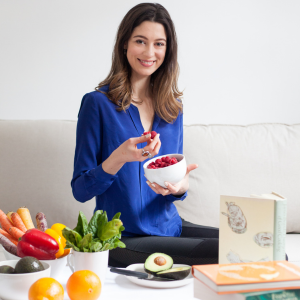The Truth about Fruit – Plus When to Eat it
June 12, 2023
Written By: Eva Papadogiorgaki
Heaven knows, there are a LOT of opinions surrounding fruit right now. 🗣
“Fruit is pure sugar, avoid it at all costs” “Fruit will make you gain weight!” “Fruit has carbs!”
While some of this can be true, it’s taken out of context and (as usual) crucial information is missing. You might even notice most of these opinions originate from current popular diets which condemn carbs (PUH-lease – your brain needs glucose, aka carbs, to run).
So please keep reading to get the full picture, and to enjoy your fruit guilt-free.

Sugar
First things first. It’s true that fruit contains sugar, but it’s not added sugar which is what we should be avoiding in a healthy diet.
What’s magic about fruit is that it contains fiber which prevents the spike in blood sugar by metabolizing it much slower than say a donut, which provides none of the fiber or nutrients that fruit does (and I hope this is not news). It’s almost like nature knows what she’s doing, picture that!
But to make things better, besides fiber, fruit also contains water, a whole lot of vitamins, minerals, phytochemicals and antioxidants, all crucial to our health. Fruit is also filling, convenient, energizing and helps keep your bowels regular. And of course, fruit is darn tasty!

High vs. Low Glycemic Fruits
You may be wondering about fruit for diabetics, am I right? We all know at least one diabetic or pre-diabetic person that’s been told to avoid fruit. Not so. As explained, fruit comes attached to a slew of other vital nutrients (like fiber which is associated with lower risk of heart disease!) so it IS in fact part of a diabetic-friendly diet.
Now what you want to keep in mind is portion size and the type of fruit. Sorry to say dried fruit and canned fruit is not your friend in this instance. If you’re diabetic, just remember to eat fewer of the high glycemic fruit so as not to spike your blood sugar (like bananas, papayas, mango, watermelon, pineapple..) and more of the lower glycemic fruit (like apples, berries, grapefruit, cherries, pears..).
So before you cut out fruit completely, consider the health benefits of say.. a handful of blueberries or a fresh peach and if it’s worth skipping that just to avoid the sugar, or carbs.
While many may continue to support the belief that avoiding fruit completely is healthier, the repercussions of not including any fruit in your diet would be a lot worse, since you’re missing out on key nutrients. Key nutrients which are a lot harder to get adequate amounts of from other sources
Whatever current diet you choose to follow, always remember that study after study shows that a diet rich in fruit and vegetables is the healthiest choice and is linked to a lower risk of many diseases. In fact, fruit is a part of a healthy, balanced and weight-loss geared diet. Not sure where to start? Start with berries, in particular blueberries. They contain powerful antioxidants called anthocyanins which support brain and nerve health.

Fruit For Breakfast
The Pros and Cons
But right now I want to talk about the pros and cons of eating fruit for breakfast.
I know a lot of people who do eat fruit, but not for breakfast. I’m here to tell you this isn’t right or wrong, it’s what works for your body and your current needs.
Fruit can be an excellent break to a fast (aka, breakfast) because it’s easy to digest, contains an abundance of nutrients and antioxidants to start your day and it’s hydrating. There are times however when fruit might not be the best breakfast choice, so always remember to be flexible according to what your day requires of you, how you feel and what your body needs.
When eating fruit for breakfast IS a good idea:
When you are detoxing
When you had a heavy meal the night before
When you are recovering from being sick.
When your immune system or digestive system is weak
When eating fruit for breakfast is NOT a good idea:
When you have a busy day ahead of you with little time to stop and eat
When you are about to exercise
If you have a digestive intolerance to certain fruits
When you have very low blood sugar or low iron
This is a good rule to keep in mind when you feel like eating fruit for breakfast:
Ensure your next meal or snack contains protein and always have snacks on hand so you don’t get hangry, such as almonds, walnuts, or multi-grain crackers.
Bonus Tip: Adding a healthy fat or protein to your breakfast (such as Greek yogurt, hemp seeds or walnuts) will keep you full longer!

In Conclusion
While it’s true that fruit contains sugar and carbs, it is natural sugar our metabolism uses effectively while the benefits of fiber (naturally found in fruit – just like the natural sugar) improves digestive tract flow and aids in nutrient absorption. Additionally, the vitamins, minerals and antioxidants found in fresh fruit are necessary for cell health, vitality, detoxification and overall health. If you’re new to eating fruit and want to start adding it to your diet, aim for 2 pieces of fruit a day.
Remember to eat fruit you enjoy and that satisfies you. After all, it is part of every balanced, wholesome and weight-loss geared diet!
